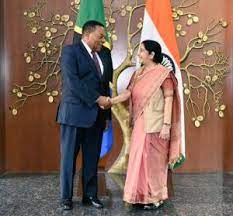
India-Tanzania Relations : A Robust Strategic Partnership
India and Tanzania share deep-rooted historical ties that date back centuries. The strategic partnership between the two nations, announced during President Samia Suluhu Hassan's state visit to India in October 2023, marks a significant milestone in their diplomatic relations. This article explores the multifaceted aspects of the India-Tanzania relationship, emphasizing the historical context, the implications of their strategic partnership, and the prospects for mutual cooperation in various domains.
Historical Ties and Maritime Cooperation:
India and Tanzania have shared historical connections, characterized by trade and cultural exchanges. Tanzania holds a crucial position in India's "Security and Growth for All in the Region" (SAGAR) vision, which underscores peace, security, and sustainable development in the Indian Ocean region. Their shared maritime borders and the significance of the Indian Ocean underscore the importance of their cooperation in maritime security and regional stability.
Tanzania's coastline along the Indian Ocean and its strategic location make it a valuable partner for India's maritime engagement. The Indian Ocean Rim Association's (IORA) Outlook on the Indo-Pacific provides a blueprint for promoting regional cooperation, and both countries recognize the potential for collaboration in this context.
Defense Cooperation and Maritime Security.
Defense cooperation is a central component of the India-Tanzania partnership. The successful Second Joint Defense Cooperation Committee meeting in 2023 resulted in a five-year roadmap for defense collaboration. India's deployment of the Indian Military Training Team (IMTT) at the Command and Staff College in Tanzania is a testament to India's commitment to enhancing Tanzania's defense capabilities.
The joint surveillance exercise in the Indian Ocean exemplifies the shared concern for maritime security. Given the increasing challenges in the Indian Ocean region, including piracy and the need for humanitarian assistance and disaster relief, India and Tanzania's collaborative efforts in this area are of paramount importance.
Trade, Investment, and Agriculture:
Economic ties between India and Tanzania have grown substantially. India ranks among the top five sources of foreign direct investment in Tanzania, with over 600 investment projects valued at billions of dollars. The announcement of an industrial park in Tanzania and discussions on conducting bilateral trade using local currencies exemplify their dedication to bolstering economic cooperation.
Agriculture remains a significant pillar of their collaboration. Tanzania exports various agricultural products to India under the Duty Free Tariff Preference (DFTP) scheme, benefiting from tariff-free access to the Indian market. These exports include cashew nuts, pigeon peas, spices, avocados, and other commodities. This trade contributes to agricultural development in both nations.
Development Partnership and Education:
Tanzania has benefited from India's development assistance across various sectors. India's support in water, health, education, capacity building, and information and communication technology (ICT) has had a tangible impact on the country. Scholarships offered by India have helped in capacity building and fostering academic exchanges.
Furthermore, India has extended its technological expertise by offering to collaborate on space technologies and digital public infrastructure. This includes the adoption of India Stack technologies, such as Unified Payments Interface (UPI) and Digital Unique Identity (Aadhar). These initiatives have the potential to transform Tanzania's technological landscape and contribute to digital inclusion.
A Bridge to the African Union and Global South:
The strengthening of India-Tanzania relations transcends bilateral ties. It holds strategic implications for India's role in the African Union and its position within the Global South. India's engagement with African countries is pivotal in shaping the narrative of the Global South and fostering collaboration on global issues.
Tanzania's role within the African Union aligns with India's SAGAR vision, emphasizing the importance of the Blue/Ocean economy. This alignment provides a unique platform for India to further engage with the African Union and strengthen its presence in the region.
Cultural Exchange and People-to-People Ties:
Beyond the realm of diplomacy and economic collaboration, India and Tanzania share a rich cultural exchange and robust people-to-people connections. The Cultural Exchange Programme between the two nations for the years 2023-2027 further reinforces this aspect of their partnership. Cultural ties help build understanding and strengthen bonds between the two nations.
Conclusion:
The elevation of India-Tanzania relations to a Strategic Partnership is a testament to the mutual commitment of both nations to broaden their cooperation in various domains. Their historical connections, shared maritime borders, and strategic interests in the Indian Ocean region provide a solid foundation for this partnership.
Defense cooperation and joint surveillance exercises reflect their shared commitment to regional security, particularly in the Indian Ocean. Economic collaboration, including investment, trade, and agricultural ties, showcases their commitment to mutual prosperity.
Development assistance in various sectors, along with the transfer of technological expertise, demonstrates their dedication to capacity building and technological advancement. Tanzania's role within the African Union and India's engagement with the Global South further elevate the significance of their partnership.
As India and Tanzania continue to strengthen their ties, the future holds immense potential for both nations. Their strategic partnership not only benefits the two countries but also contributes to regional and global stability, prosperity, and cooperation. It serves as a model for fruitful collaboration in the ever-evolving landscape of international relations.